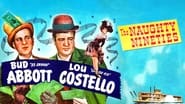weezeralfalfa
This 1945 Abbott and Costello musical comedy has them doing a 'period' plot, supposedly in the 1890s. Also often labeled the 'gay' nineties, there are a fair number of brief 'show' segments, which work right into the story. A&C begin as actor and roustabout, respectively, for the River Queen: a Mississippi River showboat, later turned into a floating casino by its new majority owners. Incidentally, the historic River Queen of this era never plied the Mississippi, but was used for coastal and river transport on the East Coast. Rita Johnson, as Bonita, plays the 'bad' girl, who has her henchmen, Joe Sawyer, as Baily, and Alan Curtis, as Crawford, help her engage in crooked, when ever possible, gambling activities. By winning 3/4 interest in the River Queen from an inebriated Captain Sam(Henry Travers), the 'gang of 3' turns the River Queen from a showboat into a casino, with most games fixed in favor of the house. Her ambition is to build a lavish show place and casino in New Orleans, using profits from the River Queen to finance such. Toward this end, she offers the Captain $5000. for the remaining 1/4 share in the boat, but the Captain refuses. He suggests they play one open game of poker, winner take all. Amazingly, Bonita agrees, although, with even odds, she stands to lose much more than the Captain. Lois Collier, as Caroline: daughter of Captain Sam, is the 'good' girl. She's the main songbird for the Captain's shows, sing(dubbed) the classic "On a Sunday Afternoon", and the newly composed "I Can't Get You Out of my Mind". Toward the end of the film, surprisingly, she begins to get friendly with Crawford( Alan Curtis): one of Bonita's henchmen, who claims he only teamed up with Bonita because he owed her gambling debts. I noticed that he wasn't involved in chasing A&C after Captain Sam won his boat back, and it was only Baily and Bonita who left town in a buggy. However, there were no further positive indications of a Crawford & Caroline romance.A&C are up to their usual antics. They do a longer version of 'Who's on first' than the version they did in their 1940 film "One Night in the Tropics". Actually, I thought is was too long, with too much repetition. Hence, I continue to prefer their 1940 version....Lou also repeats his 'poisoned wine' sketch he did in "Pardon my Sarong", with bad girl Bonita putting some questionable pill in his wine, thinking he didn't see. He switches the glasses after distracting her attention, but she sees it. This goes back and both several times. The sketch ends differently than the first time....In the finale "Uncle Tom's Cabin", Lou plays an angel. When he is raised, the too thin rope breaks and he goes through the too flimsy floor. This is reminiscent of a similar fall through the floor in "Who Done It?" A&C try gambling to win back some money for Captain Sam. However, the ball keeps coming out of their slot, careening crazily, with the wheel stopped. They then try shooting dice, with Lou under the table with a huge magnet that causes the 'loaded' dice to turn over until they add to 7.Lou engages in the 'fake mirror' sketch, where he's on the opposite side of s window his victim thinks is a mirror, and mimics their actions. Actually, this is clearly the poorest example of this trick I've seen. For much more convincing examples, see "The Princess and the Pirate" or "Duck Soup".A&C are in a back room, next to the kitchen, when they hear the cooks talking about 'cooking the cat', meaning catfish. But there are several kitty cats around, and Lou thinks they mean one of them. Every time he reluctantly pokes his meat with his fork, he hears a cat scream. Also, when he pours his milk onto his dish, it's immediately absorbed by the meat, with the slurping sound. When he strokes the meat it purrs. Abbott experiences no such spooky reactions. Then, Lou is on stage, practicing his singing of "My Bonnie Lies Over the Ocean", reading from sheet music. Meanwhile, Abbott is behind him, directing the placement of a backdrop. He keeps saying "higher, higher", and Lou sings in higher and higher keys. When Abbott says farther to the front, Lou falls off the stage.There are further sketches and other comedy. Many of these routines are pasted onto the plot, but that's OK. With the reservations I mentioned, I recommend this film for those who like A&C shtick.
wes-connors
In the 1890s, Bud Abbott and Lou Costello (as Dexter Broadhurst and Sebastian Dinwiddle) are entertainers on a Mississippi River showboat. The captain of "The River Queen" Henry Travers (as Sam Jackson) loses a percentage of his ownership to some unscrupulous gamblers. So, Abbott and Costello lend him their comic hands. Considering the money they were making for Universal, this is a surprisingly slipshod production for the comedy duo. It consists of haphazard routines, tossed in with an irrelevant plot and an ending chase scene. Marx Brothers bits, and even Buster Keaton's "House Falling" scene, are tossed into the mix. The deservedly famous "Who's on First?" stand-up is cheaply dressed; this is not, as touted, their best version of the routine. But, the "Cat Eating" is very well done; helping make the total package medium, if not rare.***** The Naughty Nineties (6/20/45) Jean Yarbrough ~ Lou Costello, Bud Abbott, Alan Curtis, Rita Johnson


